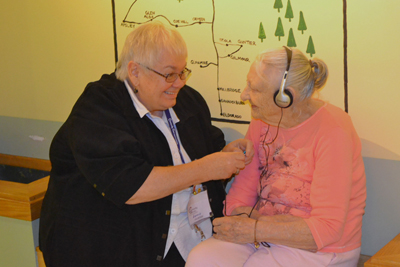Headline News » News
Music brings joy to Manor residents
June 16, 2016

Volunteer Lorrie Moshenko delights as Eileen Kranz begins to enjoy the songs of Patsy Cline on her iPod.
By Tony Pearson
The Alzheimer Society of Hastings-Prince Edward is helping Alzheimer patients connect with loved ones through their shared memories of music.
Shakespeare said it over 400 years ago: “Music can minister to minds diseased, and raze out the written troubles of the brain.” Modern science has confirmed it.
Concetta Tomaino and Dr. Oliver Sacks (author of Awakenings), pioneered the use of music as a therapy for those with various forms of dementia. She wrote that “emotional memories are very well preserved despite Alzheimer’s, especially love and affection. So songs that carry those emotional memories are the best retained. Chaotic brain activity diminishes as a song holds their attention. It pulls everything together so the person is whole, centred in the moment.”
The local Alzheimer society provides these moments through a program called Music for Me, made possible by the support of the Mormons’ Memorial Fund.
Volunteer Brian Monroe takes information from family and caregivers to search out meaningful musical numbers – sometimes from iTunes, sometimes from donated albums. He then develops a personalized playlist for patients and transcribes the music onto an iPod Shuffle.
The Music for Me program now has over 30,000 songs in its music library. Monroe has digitized 8000 songs from his own music collection.
People are welcome to donate to the collection, in whatever format they have their music on, including CD’s, tapes and vinyl albums. Monroe can transform them all into digital tracks.
Next, volunteer Lorrie Moshenko goes to the Cheddar wing of Centennial Manor. There she visits with residents signed up for the program. She doses them, not with medicine, but with music.
Moshenko noted all the hours manor staff put into making the Cheddar wing comfortable. The delivery of music to patients adds to this effort, and has a calming effect.
“It just becomes a mellower place,” Moshenko observed.
Moshenko visits the manor twice a week however, the headsets and iPods used for the program remain at the manor.
Last week, I followed her on her rounds and watched as she put a headset on Eileen Kranz. Kranz had been a country music fan before she was diagnosed with Alzheimer’s. When the voice of Patsy Cline came through the headphones, Kranz face lit up. She smiled and a note of unmistakeable pleasure emerged from her throat.
“Music for Me is an opportunity for patients to join the past with the present,” sai d Moshenko. “It offers a sense of serenity to its clients, and to their families as well.”
“Staff were originally uncertain about this project,” said society Support Coordinator Sarah Krieger. “Now they are believers.”
The program is available to those still managing cognitive difficulties on their own, or for those being cared for in the community. Music for Me now needs volunteers to meet the demands for the program. More could be done if more people were willing to take the gift of music to those who need it.
If you’d like to volunteer, Kriger urges you to call her at 613-332-4614, or e-mail her at [email protected].

















